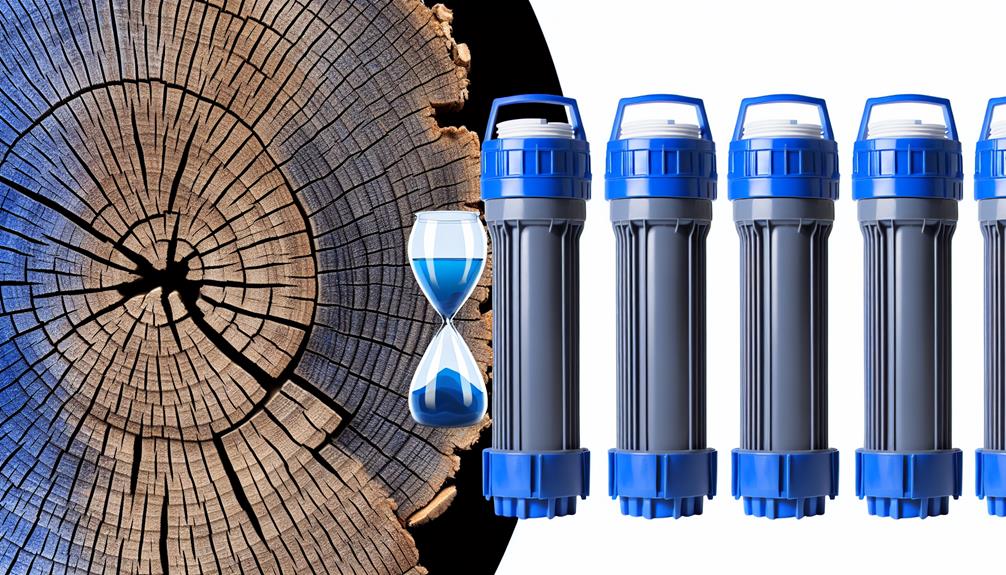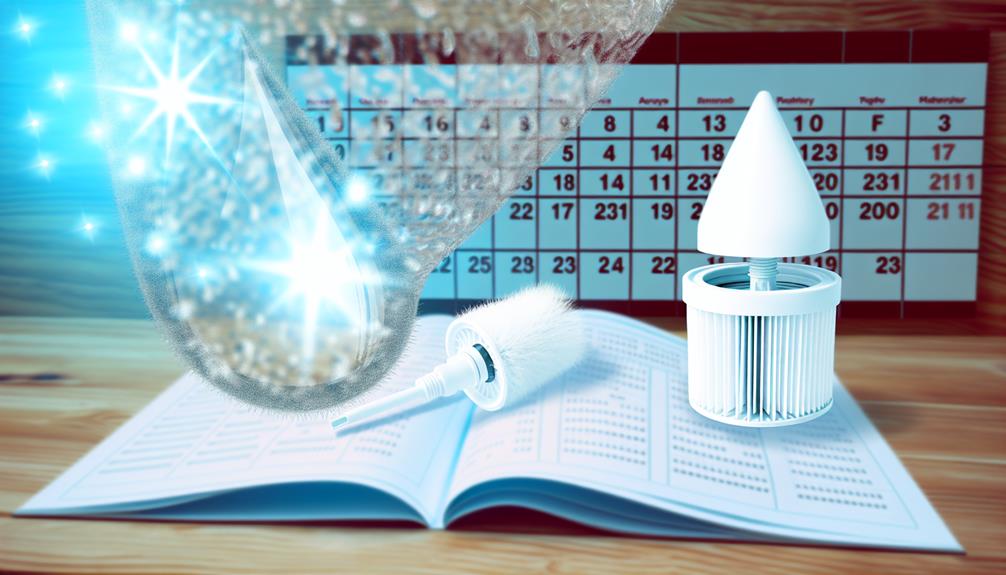Imagine your water filter as a diligent but silent guardian, tirelessly ensuring your drinking water remains pure and untainted. You're well aware that even the most steadfast protectors have their limits, but do you know when your filter's vigil should rightfully end?
Your filter's performance can be affected by a slew of factors, from the hardness of your water to the frequency of your usage, each playing a pivotal role in its longevity. It's crucial not only for the taste and safety of your water but also for the health of your wallet to identify when a replacement is due.
Uncover the secrets behind your filter's lifespan with our insightful quiz, and gain the knowledge to determine the precise moment before your filter's efficiency wanes, ensuring your trusty barrier against contaminants doesn't outstay its welcome.
Assessing Water Hardness Impact
Understanding how water hardness affects the lifespan of your filters is crucial for optimal maintenance and performance. Water hardness, characterized by high mineral content, particularly calcium and magnesium, can significantly shorten the life of your filtration systems. When these minerals are present in large quantities, they can cause sediment and particles to accumulate within the filters, hindering their efficiency and reducing their overall effectiveness.
Different filters within your system have varying tolerances to these hard water conditions. For example, carbon filters, which are adept at removing chlorine and organic compounds, may last up to six months under soft water conditions, but the presence of hard water necessitates more frequent replacements. Similarly, sediment filters, which capture larger particles, typically have a three-month lifespan, but this can be dramatically lessened by hard water.
Installing a water softener system can be a game-changer in extending the life of subsequent filters. By removing the hardness before the water reaches other stages of filtration, soft water ensures that minerals and materials that contribute to filter clogging are significantly reduced.
To maximize the lifespan of your NuvoH2O filters, which are integral to water softener systems, it's essential to assess not only water hardness but also your household's water usage patterns.
Identifying Filter Types
Recognizing the influence of water hardness on your filtration system's longevity leads us to examine the various types of water filters and their specific lifespans.
The type of water filter you use is crucial in determining when a replacement is necessary. Carbon water filters, commonly found in many households, are typically used for up to 6 months before their efficacy diminishes. On the other hand, sediment water filters, which are often the first line of defense in a filtration system, have a shorter lifespan of around 3 months due to their role in capturing larger particles.
For those utilizing water softener systems like NuvoH2O, filters have a considerable lifespan ranging from 20,000 to 50,000 gallons, equating to about 6 months of usage. These filters are essential for removing hardness minerals from your water.
Ion exchange systems, adept at removing soluble ions such as heavy metals and certain minerals, are another type of filter used in specialized applications.
Lastly, mineral addback filters, usually paired with reverse osmosis (RO) systems, are designed to reintroduce essential electrolytes and minerals to improve the water's taste and alkalinity.
Each water filter type has a distinct functional period and should be monitored for timely replacement to ensure optimal water quality.
Water Softener System Benefits
By incorporating a water softener system into your home, you can effectively prolong the life of your water filters and ensure your appliances operate more efficiently. The core water softener system benefits stem from its ability to mitigate water hardness, a common cause of scale buildup in plumbing and appliances. By removing minerals such as calcium and magnesium, which contribute to water hardness, these systems prevent the accumulation of scale that can impede water flow and efficiency.
Moreover, water softeners play a crucial role in filtering out large particles that might otherwise reach and clog your water filters. This pre-emptive filtration translates to less frequent changes of filters in appliances like fridges and coffee machines, reducing cleaning demands and maintenance efforts. Consequently, you save time and resources that would otherwise be spent on routine filter replacements.
Additionally, water softener systems enhance the taste and odor of your water by eliminating impurities and sediments. This ensures that you're not just extending the lifespan of your filters, but also improving the quality of your drinking water.
In essence, by using a water softener, you're investing in healthier, safer drinking water and maximizing the efficiency of your water filtration system.
NuvoH2O Filter Lifespan
While a water softener system can significantly extend the life of your water filters, the NuvoH2O filters themselves boast a robust lifespan of 20,000 to 50,000 gallons before a replacement is necessary. This substantial range means that you won't need to replace your filter too frequently, which isn't only convenient but also cost-effective.
However, this nuvoh2o filter lifespan isn't set in stone; several factors can affect it, such as the hardness of your water and how much water you use. To ensure you're getting the most out of your filter, keep these points in mind:
- Usage Pattern: The more water you use, the sooner you'll need a filter change.
- Water Hardness: Higher levels of minerals in your water can shorten the filter's lifespan.
- Maintenance: Regular checks can help you gauge when your filter will need to be replaced.
Recognizing Replacement Indicators
To ensure your water filter is performing optimally, watch for altered taste, unusual odors, or discoloration in your tap water, as these changes may signal the need for a filter replacement. These sensory cues are critical replacement indicators that you can't ignore. They suggest contaminants are bypassing your filter or that it's no longer functioning as designed.
Your filter's need for replacement doesn't hinge solely on these signs. Water usage and system type significantly influence your filter's lifespan. High consumption rates or heavy sediment presence can shorten filter life. Conversely, lower usage might mean your filters need replacement less frequently.
Analyzing the technical aspects, consider NSF P standards when judging your filter's performance. NSF P protocols provide a benchmark for evaluating the reduction of specific contaminants. If your water quality tests reveal a rise in these contaminants, it's a clear indicator that your filter's efficacy is compromised.

